Opinion
Need for an executive speak on environment
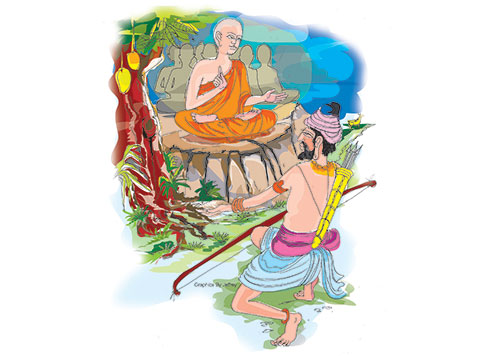
King Devanapiya Tissa on the advice of Arahat Mahinda in the 3C. BCE made a far reaching statement for the environment, that not only man, but the animals in the forests, the birds in the air and the fish in the rivers and oceans have an equal right to live. It was understood that this was possible, only if the environment was protected. All kings that followed, respected this request. The highland forests were designated and declared “Deviyange Ratta”, not for exploitation. This effect was twofold, the animals were happy they had a secure space, and water security for the myriads of irrigation schemes that dotted the land was ensured. This simple rule was observed inviolate till the arrival of the colonial British in 1796.
The colonial package was if there is resource that could be exploited and or taxed it should be done. The clearing of millions of acres of prime forest land that constituted the cloud forests, to accommodate the plantation enterprise and with it the decimation, the cold blooded killing of thousands of elephants, male, female and even the young, all totally defenceless, by proud, arrogant colonial big game hunters with their powerful elephant guns. The elephants were all declared as pests, and were shot in the forest, and the hunters collected a couple of shillings for the tail as proof of their bravery. Ceylon witnessed the genocide of beautiful creatures, who only wanted a space to live.
The destruction of the forests, destroyed the water resources that irrigated the rivers and soon the village tanks went dry. The tanks were abandoned and similarly the fields. The colonial British were happy, they got their plantation revenue. But Ceylon was robbed of its cloud forests and its population of elephants, including tuskers by this indiscriminate systematic and even sudden annihilation of the elephant herds that lived happily in the forests. This is the prime reason for the reduced number of tuskers amongst the herds in Sri Lanka.
Over 35,000 elephant tusks from Ceylon were recorded at a store in a warehouse on the London docks. The quality of Ceylon elephant ivory was regarded as being superior and all the early piano keys were made from ivory collected by the indiscriminate killing of elephants in Ceylon. Giving rise to piano playing as tickling the ivories.
Everything exported was a profit. It has been said that the London underground was funded by the profit from the export of Ceylon tea. Certainly the colonial British took out more than they put in. This could be said of the Portuguese, the Dutch, and more so the British. They selfishly developed their countries at tremendous cost to countries like Ceylon, India, and in Africa and the Far East. They were all ruthless and the local population continued to suffer at the hands of the Black white men they nurtured and produced.
We still follow a colonial system of education. We are not producing students who are innovative. Those who can think. We are producing students capable of getting through examinations. Tuition is consolidating the student who is not allowed to think, only to do what is told. This was the colonial strategy and requirement. You do what you are told. We still follow the colonial method. We need to change. The future is in innovation and creativity.
The colonial system of indiscriminate exploitation of the resources is not the way forward, especially as it is based on profit, it is not sustainable. This is not development. The development as requested by two thirds of the population was a development that would benefit all the citizens of Sri Laṅkā, not an individual or a small group. A development that would also protect the environment, to be passed on to future generations in pristine form.
At present various agencies seem to act in their own cocoons, forgetting and without any reference that what they do, may affect another important agency. Sri Lanka has sufficient legislation to cover every eventuality. Some agencies prefer to change laws so that the primary legislation is confused. Agencies approving projects have to be more careful. Finally, it is not the investment only, but importantly, the possible future damage to the water security of the village, and many others, like the cost to the environment that should be considered.
The real need of the day is a statement from the Executive that all legislation, rules and regulations shall be adhered to, and shall remain inviolate or face the consequences. Almost a King Devanampiya Tissa statement in 2020 that would protect the environment of this beautiful country forever. This is what two thirds of the population wanted.
ASHLEY De VOS
Opinion
LSSP @ 90: The Sama Samaja Role in Constitutional Issues

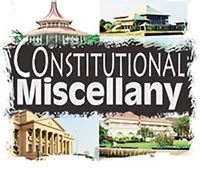 On the occasion of the ninetieth anniversary of the Lanka Sama Samaja Party (LSSP), this article highlights the party’s positions on constitutional matters. When the LSSP was founded, it had two primary objectives: obtaining complete political independence for Sri Lanka and building a socialist society. The first of these was achieved in two stages. The LSSP directly contributed to achieving semi-independence in 1948 through its anti-imperialist struggle and full political independence in 1972. The second objective remains a distant goal.
On the occasion of the ninetieth anniversary of the Lanka Sama Samaja Party (LSSP), this article highlights the party’s positions on constitutional matters. When the LSSP was founded, it had two primary objectives: obtaining complete political independence for Sri Lanka and building a socialist society. The first of these was achieved in two stages. The LSSP directly contributed to achieving semi-independence in 1948 through its anti-imperialist struggle and full political independence in 1972. The second objective remains a distant goal.
Citizenship Act
In the very second year after independence, the D. S. Senanayake government acted to deny citizenship to the Hill-Country Tamil community and, consequently, deprived them of voting rights. In the 1947 election, many Hill-Country Tamils—who voted as British subjects—were inclined toward the Left, and especially toward the Sama Samaja Party. In that election, the Ceylon Indian Congress won seven seats, and with the support of plantation workers in areas where they were numerous, several left-wing candidates were also elected.
Seeing the long-term danger in this alliance, the Sri Lankan capitalist class ensured that the Citizenship Act defined the term “citizen” in a way that denied citizenship to hundreds of thousands of Hill-Country Tamil people. As a result, they also lost their voting rights. At that time, it was the Left, led by the Sama Samaja Party, that opposed this.
While the Tamil Congress, a coalition partner of the government at the time, voted in favour of the legislation, S.J.V. Chelvanayakam stated that the inability of Tamil leaders to protect their cousins—the Hill-Country Tamil community—showed that being a partner in a Colombo-based government brought no benefit to minority groups. He argued that the lesson to be learned was the need for self-government in the regions where they lived. Chelvanayakam’s founding of the Federal Party was one consequence of this process.
Although section 29 of the 1947 Constitution purported protection by providing that no law shall make persons of any community or religion liable to disabilities or restrictions to which persons of other communities or religions are not made liable, neither the Supreme Court of Ceylon nor the Privy Council in England, which was then the country’s highest appellate court, afforded any relief to the Hill-Country Tamil community.
Parity of Status for Sinhala and Tamil and the Ethnic Issue
When the UNP and the SLFP, both of which had previously agreed to grant equal status to the Sinhala and Tamil languages, reversed their positions in 1955 and supported making Sinhala the sole official language, the LSSP stood firmly by its policy of parity. Earlier, when a group of Buddhist monks met N. M. Perera and told him they were prepared to make him Prime Minister if he agreed to make Sinhala the only official language, he rejected the proposal. Had the country heeded Colvin R. de Silva’s famous warning— “One language, two countries; two languages, one country”—the separatist war might have been averted. Because the Left refused to be opportunistic, it lost public support.
During the 1956 debate on the Official Language Bill, Panadura LSSP MP Leslie Goonewardene warned: “The possibility of communal riots is not the only danger I am referring to. There is the graver danger of the division of the country; we must remember that the Northern and Eastern provinces of Ceylon are inhabited principally by Tamil-speaking people, and if those people feel that a grave, irreparable injustice is done to them, there is a possibility of their deciding even to break away from the rest of the country. In fact, there is already a section of political opinion among the Tamil-speaking people which is openly advocating the course of action.” It is an irony of history that Sinhala was designated the sole official language in 1956, yet in 1987, both languages were formally recognised as official.
1972 Republican Constitution
Colvin’s contribution to the making of the 1972 Republican Constitution, which severed Sri Lanka’s political ties with Britain, was immense. Preserving the parliamentary system, recognising fundamental rights, and incorporating directive principles of state policy that supported social justice were further achievements of that Constitution. It also had its weaknesses, and any effort to assign full responsibility for them to Colvin must also be addressed.
In the booklet that he wrote on the 1972 Constitution, he said the following regarding the place given to Buddhism: “I believe in a secular state. But you know, when Constitutions are made by Constituent Assemblies, they are not made by the Minister of Constitutional Affairs.” What he meant was that the final outcome reflected the balance of power within the Constituent Assembly. As a contributor to constitution drafting, this writer’s experience confirms that while drafters do have a role, the final outcome on controversial issues depends on the political forces involved and mirrors the resultant of those forces.
In fact, the original proposal approved by the Constituent Assembly was that Buddhism should be given its “rightful place” as the religion of the majority. However, the subcommittee on religion, chaired by Prime Minister Sirimavo Bandaranaike, changed this to “foremost place.” It is believed that her view was influenced by the fact that one of her ancestors had signed the 1815 Kandyan Convention, in which Buddhism was declared inviolable, and the British undertook to maintain and protect its rites, ministers, and places of worship.
As Dr Nihal Jayawickrama, a member of the committee that drafted the 1972 Constitution, has written, the original draft prepared by Colvin did not describe Sri Lanka as a unitary state. However, Minister Felix Dias Bandaranaike proposed that the country be declared a “unitary state”. Colvin’s view was that, while the proposed constitution would have a unitary structure, unitary constitutions could vary substantially in form and, therefore, flexibility should be allowed. Nevertheless, the proposed phrase found its way to the final draft. “In the course of time, this impetuous, ill-considered, wholly unnecessary embellishment has reached the proportions of a battle cry of individuals and groups who seek to achieve a homogenous Sinhalese state on this island”, Dr Jayawickrama observed.
Indeed, the failure of the 1972 Constitution to make both Sinhala and Tamil official languages was a defeat for the Left. Allowing the use of Tamil in the courts of the Northern and Eastern Provinces and granting the right to obtain Tamil translations in any court in the country were only small achievements.
Devolution
The original Tamil demand was for constitutionally guaranteed representation in the legislature. Given that, in the early stages, they showed greater willingness to share power at the centre than to pursue regional self-government, it is not surprising that the Left believed that ethnic harmony could be ensured through equality. After the conflict escalated, N. M. Perera, now convinced that regional autonomy was the answer to the conflict, wrote in a collection of essays published a few months before his death: “Unfortunately, by the time the pro-Sinhala leaders hobbled along, the young extremists had taken the lead in demanding a separate State. (…) What might have satisfied the Tamil community twenty years back cannot be adequate twenty years later. Other concessions along the lines of regional autonomy will have to be in the offing if healthy and harmonious relations are to be regained.”
After N. M.’s death, his followers continued to advance the proposal for regional self-government. At the All-Party Conference convened after the painful experiences of July 1983, Colvin declared that the ethnic question was “a problem of the Sri Lanka nation and state and not a problem of just this community or that community.” While reaffirming the LSSP’s position that Sri Lanka must remain a single country with a single state, he emphasised that with Tamils living in considerable numbers in a contiguous territory, the state as presently organised does not serve the purposes it should serve, especially in the field of equality of status in relation to the state, the nation and the government. The Left supported the Thirteenth Amendment in principle. More than 200 leftists, including Vijaya Kumaratunga, paid the price with their lives for doing so, 25 of whom were Samasamajists. The All-Party Representatives Committee appointed by President Mahinda Rajapaksa and chaired by LSSP Minister Tissa Vitharana, proposed extensive devolution of power within an undivided country.
Abolishing the Executive Presidency
It is unsurprising that N. M. Perera, who possessed exceptional knowledge of parliamentary procedure worldwide and was one of the finest parliamentarians, was a staunch defender of the parliamentary system. In his collection of essays on the 1978 Constitution, N. M. noted that the parliamentary form of government had worked for thirty years in Sri Lanka with a degree of success that had surprised many Western observers. Today, that book has become a handbook for advocates of abolishing the executive presidency. The Left has consistently and unwaveringly supported the abolition of the executive presidential system, and the Lanka Sama Samaja Party has contributed significantly to this effort.
The National People’s Power, in its presidential election manifesto, promised a new constitution that would abolish the executive presidency, devolve power to provinces, districts, and local authorities, and grant all communities a share in governance. However, there appears to be no preparation underway to fulfil these promises. It is the duty of the Left to press for their implementation.
In an article published in The Island on June 6 this year, to commemorate N. M. Perera’s 120th birth anniversary, the writer wrote: “The Left may be weaker and fragmented; nevertheless, the relevance and need for a Left alternative persist. If the LSSP can celebrate its 90th anniversary as a reunited party, that could pave the way for a stronger and united Left as well. Such a development would be the best way to honour NM and other pioneering leaders of the Left.” It is encouraging that some discussion on this matter has now emerged. Merely discussing the history of the LSSP and the Left is insufficient; action is required. It is the duty of leftists to disprove Bernard Soysa’s sarcastic remark, “left activists are good at fighting for the crown that does not exist.”
by (Dr) Jayampathy Wickramaratne,
President’s Counsel
Opinion
A harsh reflection of Sri Lanka’s early-warning gap
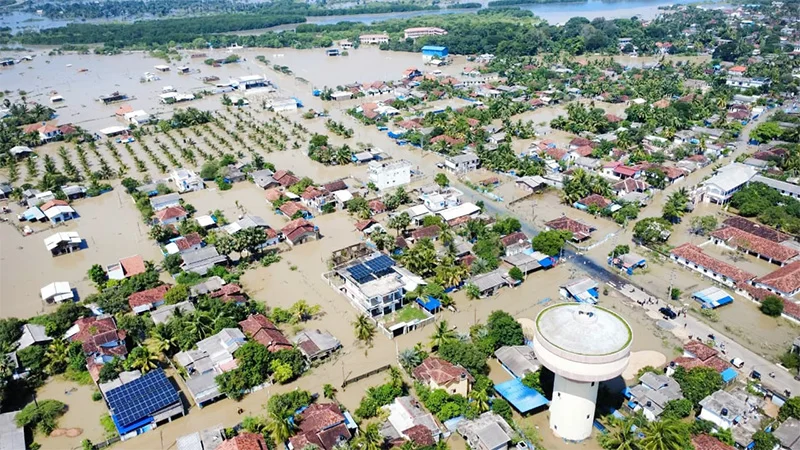
Cyclone Ditwah:
Cyclone Ditwah, which swept across Sri Lanka at the end of November, caused massive damage to the country, the extent of which need not be mentioned here, as all are aware of it by now. Heated arguments went on among many parties with regard to how this destruction could have been mitigated and who should take responsibility. Although there may have been shortcomings in several aspects of how we responded to Ditwah, this article highlights a critical area that urgently requires attention if we are to protect ourselves from similar hazards in the future.
As is common in many situations, it has once again showcased a concerning weakness in the country’s disaster-management cycle, the gap between issuing early warnings and the expected public response. The Meteorological Department, the Irrigation Department, the National Building Research Organization, and other authorities issued continuous warnings to evacuate well in advance of imminent threats of flooding, landslides, and water hazards. However, the level of preparedness and community reaction fell short, leading to far greater personal property damage, including loss of a few hundred lives.
Sri Lanka is not unfamiliar with natural disasters. One of the most devastating disasters in our history could be considered the 2004 Tsunami event, which resulted in over 35,000 deaths and over $1 billion in property damage in the coastal belt. After the event, the concepts of disaster management were introduced to the country, which we have been adhering to since then. Again in 2016, the country faced massive river flooding, especially in western and southern regions, and until recently experienced repeated floods and landslides due to rains caused by atmospheric disturbances, though less in scale. Each of these events paved the way for relevant authorities to discuss and take appropriate measures on institutional readiness, infrastructure resilience, and public awareness. Yet, Cyclone Ditwah has demonstrated that despite improvements in forecasting and communication, well supported by technological advancements, the translation of warnings into action remains critically weak.
The success of early-warning systems depends on how quickly and effectively the public and relevant institutions respond. In the case of Ditwah, the Department of Meteorology issued warnings several days beforehand, supported by regional cyclone forecasting of neighbouring countries. Other organisations previously mentioned circulated advisories with regard to expected flood risk and possible landslide threats on television, radio, and social media, with continuous updates. All the flood warnings were more than accurate, as low-lying areas were affected by floods with anticipated heights and times. Landslide risks, too, were well-informed for many areas on a larger spatial scale, presumably due to the practical difficulties of identifying such areas on a minor scale, given that micro-topography in hill country is susceptible to localised failures. Hence, the technical side of the early-warning system worked as it should have. However, it is pathetic that the response from the public did not align with the risk communicated in most areas.
In many affected areas, people may have underestimated the severity of the hazard based on their past experiences. In a country where weather hazards are common, some may have treated the warnings as routine messages they hear day by day. As all the warnings do not end up in severe outcomes, some may have disregarded them as futile. In the meantime, there can be yet another segment of the population that did not have adequate knowledge and guidance on what specific actions to take after receiving a warning. This could especially happen if the responsible authorities lack necessary preparedness plans. Whatever the case may be, lapses in response to early warnings magnified the cyclone’s impact.
Enforcing preventive actions by authorities has certain limitations. In some areas, even the police struggled to move people from vulnerable areas owing to community resistance. This could be partly due to a lack of temporary accommodation prepared in advance. In some cases, communities were reluctant to relocate due to concerns over safety, privacy, and the status quo. However, it should be noted that people living in low-lying areas of the Kelani River and Attanagalu Oya had ample time to evacuate with their valuable belongings.
Hazard warnings are technical outputs of various models. For them to be effective, the public must understand them, trust them, and take appropriate action as instructed. This requires continuous community engagement, education, and preparedness training. Sri Lanka must therefore take more actions on community-level disaster preparedness programs. A culture of preparedness is the need of the day, and schools, religious institutions, and community-based organisations can play an important role in making it a reality. Risk communication must be further simplified so that people can easily understand what they should do at different alert levels.
Cyclone Ditwah has left, giving us a strong message. Even an accurate weather forecast and associated hazard warnings cannot save lives or property unless the public responds appropriately. As it is beyond doubt that climate change intensifies the frequency and severity of extreme weather events, people in Sri Lanka have to consider preparedness as a routine part of life and respond to warnings promptly to mitigate damage from future disasters.
(The writer is a chartered Civil Engineer)
by Eng. Thushara Dissanayake
Opinion
Feeling sad and blue?

Here is what you can do!
Comedy and the ability to have a good laugh are what keep us sane. The good news to announce is that there are many British and American comedy shows posted up and available on the internet.
They will bring a few hours of welcome relief from our present doldrums.
Firstly, and in a class of its own, are the many Benny Hill shows. Benny is a British comedian who comes from a circus family, and was brought up in an atmosphere of circus clowning. Each show is carefully polished and rehearsed to get the comedy across and understood successfully. These clips have the most beautiful stage props and settings with suitable, amusing costumes. This is really good comedy for the mature, older viewer.
Benny Hill has produced shows that are “Master-Class” in quality adult entertainment. All his shows are good.
Then comes the “Not the Nine o’clock news” with Rowan Atkinson and his comedy team producing good entertainment suitable for all.
And then comes the “Two Ronnies” – Ronnie Barker and Ronnie Corbett, with their dry sense of humour and wit. Search and you will find other uplifting shows such as Dave Allen, with his monologues and humour.
All these shows have been broadcast in Britain over the last 50 years and are well worth viewing on the Internet.
Similarly, in The USA of America. There are some really great entertainment shows. And never forget Fats Waller in the film “Stormy Weather,” where he was the pianist in the unforgettable, epic, comedy song “Ain’t Misbehavin”. And then there is “Bewitched” with young and glamorous Samantha Stevens and her mother, Endora who can perform magic. It is amazing entertainment! This show, although from the 1970s was a milestone in US light entertainment, along with many more.
And do not overlook Charlie Chaplin and Laurel and Hardy, and all the Disney films. Donald Duck gives us a great wealth of simple comedy.
The US offers you a mountain of comedy and good humour on Youtube. All these shows await you, just by accessing the Internet! The internet channel, ‘You tube’ itself, comes from America! The Americans reach out to you with good, happy things right into your own living room!
Those few people with the ability to understand English have the key to a great- great storehouse of uplifting humour and entertainment. They are rich indeed!
Priyantha Hettige
-

 Business7 days ago
Business7 days agoCabinet approves establishment of two 50 MW wind power stations in Mullikulum, Mannar region
-

 Features4 days ago
Features4 days agoWhy Sri Lanka Still Has No Doppler Radar – and Who Should Be Held Accountable
-

 Features6 days ago
Features6 days agoDitwah: A Country Tested, A People United
-
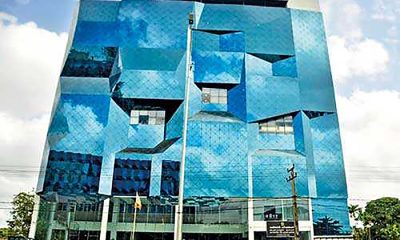
 News6 days ago
News6 days agoRs 1. 3 bn yahapalana building deal under investigation
-
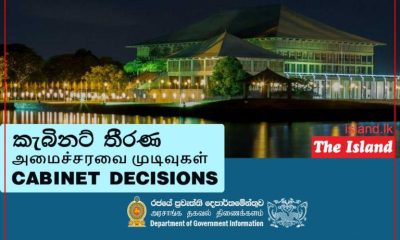
 News7 days ago
News7 days agoCabinet approves the transfer of the constructions and land reserved for the Kiinniya University to the Ministry of Foreign Affairs, Foreign Employment, and Tourism
-
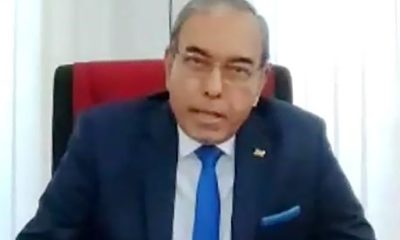
 News6 days ago
News6 days agoFormer SAARC SG Esala Weerakoon calls for ‘South Asian Climate Compact’
-

 Business6 days ago
Business6 days agoFluctuating fortunes for bourse in the wake of selling pressure
-

 Opinion6 days ago
Opinion6 days agoComfort for some, death for others: The reality of climate change













